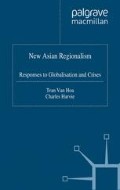Abstract
Thailand has a considerable reputation for maintaining strong fiscal discipline. A key ingredient of the country’s fiscal policy is its strong built-in automatic stabiliser component. Such a so-called ‘automatic stabiliser’ effect was due to the fact that the country normally ran surpluses in high growth years and deficits in slow-growth years (see Figure 10.1). In times of economic expansion, the government normally operates a budget surplus to prevent the growth performance from over heating the economy and resulting in run away inflation. On the other hand, during times of economic downturn or economic slump, the government normally fosters a policy of budget deficits in order to provide appropriate cover for an economic setback. As a result, for a period of 20 years, from 1976 to 1996, the Thai economy grew at an average of 8 per cent annually, making it a relatively strong East Asian economy during this period.
Access this chapter
Tax calculation will be finalised at checkout
Purchases are for personal use only
Preview
Unable to display preview. Download preview PDF.
References
In English
Department of Industrial Promotion (DIP) (2001), ‘A Thai View on Development of SMEs and Their Human Resources’, presented at ‘Foundation for International Human Resource Development’, Leadership Forum 2001, Bangkok, 16 March.
Puntasen, A. (2000), ‘Reviewing the Asian Economic Crisis: Lesson for Future Sustainable Development’, in G. B. Hainsworth (ed.), Globalization and the Asian Economic Crisis: Indigenous Responses, Coping Strategies, and Governance Reform in Southeast Asia, Centre for Southeast Asia Research, Institute of Asian Research, University of British Columbia, Vancouver, Canada.
Robalino, D. and Ghani, E. (2000), ‘Thailand: Macro Economic Update’, East Asia and Pacific Macro Economic, 5 September.
World Bank (2000a), Thailand Public Finance in Transition, Report no. 20656, Thai, Poverty Reduction and Economic Management Unit, East Asia amd Pacific Region, 29 August.
World Bank (2000b), Thailand Economic Monitor, February. (available at http://www.worldbank.or.th/monitor).
In Thai
Apichai, P. (2000), ‘The King’s Sufficiency Economy and Analytical Interpretations by Economists’, Journal o f Agricultural and Cooperative Bank, April-July.
Kitti Limskul (2001) Part of a Panel Discussion on ‘Critical Analysis of the Government Policy’, organised by MFC Asset Management Public Company Limited, at Grand Ballroom, Grand Hyatt Arawan, Wednesday, 21 March, 09.50–11.50 am.
Krungthep Dhurakij (2001), ‘Fund to Support Medium Size Business’, Tuesday, 20 March.
Krungthep Dhurakij (2001) “Tharin” Criticized TAMC of Thai Rak Thai’, 21 March.
Office of the Prime Ministry (2001) ‘The Government Policy of the Cabinet under the Prime Minister Thaksin Shinawatr’, given to the Parliament on Monday, 26 February.
Somkid Jatusripitak (2001), a Key Note Speech of the Minister of Finance on ‘Economic Policy of the New Government’ organised by MFC Asset Management Public Company Limited, at Grand Ballroom, Grand Hyatt Arawan, Wednesday, 21 March, 09.10–09.30 am.
Thai Rak Thai (2000), Campaign Platform the Party’s Policies, National Agenda, (http://202.183.204.214/national/20agenda).
The Royal Speech (1998), Handbook for Making Livelihood for the People in 1998 and the New Theory, Bangkok (4 December), Office of the Crown Property, The Mongkol Chaipattana Company, and Bang-chak Petroleum Ltd. (a public company).
Editor information
Editors and Affiliations
Copyright information
© 2003 Palgrave Macmillan, a division of Macmillan Publishers Limited
About this chapter
Cite this chapter
Puntasen, A. (2003). The Aftermath of Thailand’s Economic Crisis and Some Possible Ways Out. In: Van Hoa, T., Harvie, C. (eds) New Asian Regionalism. Palgrave Macmillan, London. https://doi.org/10.1057/9780230377561_10
Download citation
DOI: https://doi.org/10.1057/9780230377561_10
Publisher Name: Palgrave Macmillan, London
Print ISBN: 978-1-349-51382-6
Online ISBN: 978-0-230-37756-1
eBook Packages: Palgrave Economics & Finance CollectionEconomics and Finance (R0)

